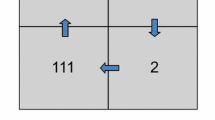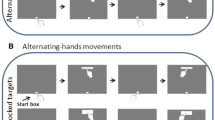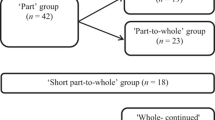Summary
The present study represented an attempt to determine the extent to which transfer performance on a novel timing task is influenced by contextual similarity (i.e., similar instructions, task requirements, etc.) between training and transfer phases of performance. All subjects were given trials on a task which involved a linear ballistic arm movement. The length of the movement was defined as the distance between a start button and a hinged target, which was knocked over by the subject at the end of the response. During training subjects attempted to produce their movements in a time of 550 ms and were given knowledge of results regarding timing error after each trial. During transfer trials a 300 ms movement time was attempted and no knowledge of results was given. Context was defined by the number of different movement distances performed during training and transfer. Half of the subjects received training trials with a single distance (constant context) while the other half received an equal number of trials with each of three distances (varied context). During the transfer stage of the experiment, subjects either performed in the same movement distance context experienced during training (i.e., constant to constant; varied to varied) or in the opposite context (i.e., constant to varied; varied to constant). The results of the transfer analysis suggested that similariy of context between training and transfer phases of performance was not crucial to the accurate production of a novel closed-timing movement. Implications of the present results for recent theories of memory development are discussed.
Similar content being viewed by others
References
Bartlett, F.C. (1932). Remembering. London: Cambridge University Press.
Battig, W.F. (1978). The flexibility of human memory. In L.S. Cermak & F.I.M. Craik (Eds.), Levels of Processing and Human Memory (pp. 23–44). Hillsdale, N.J.: Erlbaum.
Jenkins, J.J. (1977). Remember that old theory of memory? Well forget it! In R.E. Shaw & J. Bransford (Eds.), Perceiving, Acting, and Knowing: Toward an Ecological Psychology (pp. 413–429). Hillsdale, N.J.: Erlbaum.
McCracken, H.D., & Stelmach, G.E. (1977). A test of the schema theory of discrete motor learning. Journal of Motor Behavior, 9 193–201.
Newell, K.M., & Shapiro, D.C. (1976). Variability of practice and transfer of training: Some evidence toward a schema view of motor learning. Journal of Motor Behavior, 8 233–243.
Poulton, E.C., & Freeman, P.R. (1966). Unwanted asymmetrical transfer effects with balanced experimental designs. Psychological Bulletin, 66 1–8.
Schmidt, R.A. (1975) A schema theory of discrete motor skill learning. Psychological Review, 82 225–260.
Shea, J.B., & Morgan, R.L. (1979). Contextual interference effects on the acquisition, retention, and transfer of a motor skill. Journal of Experimental Psychology: Human Learning and Memory, 5 179–187.
Wrisberg, C.A., & Winter, T.P. (1982). Variability of practice and the transfer of training of motor skills. U.S. Army Research Institute for the Behavioral and Social Sciences Contract No. MDA-903-81-C-0216.
Zelaznik, H.N. (1977). Transfer in rapid timing tasks: An examination of the role of variability in practice. In D.M. Landers, & R.W. Christina (Eds.), Psychology of motor behavior and sport (Vol. 1) (pp. 36–43). Champaign, Ill.: Human Kinetics Publishers.
Author information
Authors and Affiliations
Rights and permissions
About this article
Cite this article
Wrisberg, C.A., McLean, E. Training for the production of novel timing movements: Contextual considerations. Psychol. Res 46, 169–176 (1984). https://doi.org/10.1007/BF00308601
Issue Date:
DOI: https://doi.org/10.1007/BF00308601




